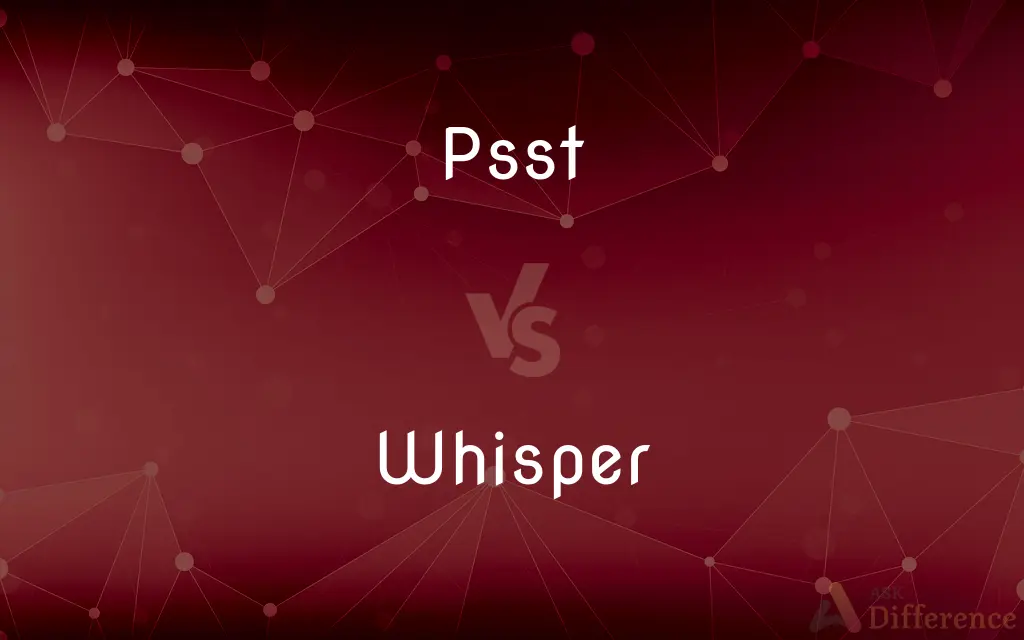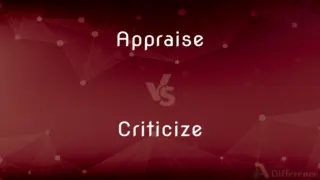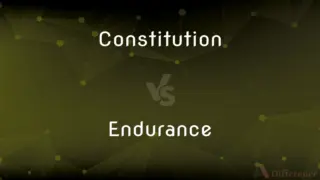Psst vs. Whisper — What's the Difference?
By Maham Liaqat & Urooj Arif — Updated on April 8, 2024
Psst is a sharp, sibilant sound used to attract attention discreetly, whereas whispering involves speaking softly and quietly, often to convey a message privately.

Difference Between Psst and Whisper
Table of Contents
ADVERTISEMENT
Key Differences
Psst is typically a short, sharp sound made by pressing the tongue against the teeth and releasing air, used to catch someone's attention without drawing widespread notice. On the other hand, whispering is a form of low-volume speech where the vocal cords do not vibrate fully, designed to convey messages that are meant to be heard by a select few.
While "psst" serves as a signal, often preceding a whispered conversation or a discreet call for attention, whispering is the act of communicating in a hushed tone to maintain privacy or secrecy. This distinction highlights "psst" as a precursor to an interaction and whispering as the interaction itself.
Psst does not convey specific information beyond the intent to initiate discreet communication. Whereas, whispering allows for the transmission of detailed messages, albeit quietly, to prevent eavesdropping by unintended listeners.
The use of "psst" is universally recognized across cultures as a means of silently getting someone's attention. Whispering, while also a quiet form of communication, varies in technique and application depending on the language and cultural context, emphasizing the versatility of whispered speech.
In digital communication, "psst" is often used in text form to mimic the sound of attracting someone's attention quietly, adding a playful or conspiratorial tone to the message. Conversely, describing something as a whisper in digital communication suggests conveying information in a confidential or secretive manner, preserving the essence of its real-world usage.
ADVERTISEMENT
Comparison Chart
Definition
A short, sharp sound for attention.
Soft, quiet speech for privacy.
Purpose
To attract attention discreetly.
To convey messages privately.
Communication
Signals intent to communicate.
Involves the actual exchange of words.
Information
Limited to the intent of interaction.
Can convey detailed messages.
Cultural Use
Universal for attracting attention.
Varies, used for quiet communication.
Compare with Definitions
Psst
Used to signal without words.
She heard a psst from the next room.
Whisper
Speaking softly to remain unheard by others.
They had to whisper in the library.
Psst
A non-verbal cue for secrecy.
Psst, can you keep a secret?
Whisper
Used for secrecy and discretion.
We need to whisper to avoid being overheard.
Psst
A sound to discreetly get someone's attention.
Psst, look over here!
Whisper
A low-volume conversation.
The room was filled with the sound of whispers.
Psst
A precursor to whispering.
Psst, let me tell you something.
Whisper
A technique for private communication.
Whisper your answer to me.
Psst
An attention grabber in quiet environments.
Psst, don't make it obvious.
Whisper
A gentle or hushed tone of voice.
He read the poem in a whisper.
Psst
Used to capture someone's attention inconspicuously.
Whisper
Soft speech produced without using the full voice.
Psst
(onomatopoeia) Implies that the speaker is sending secret or whispered information to another person.
Psst, John, don’t tell anyone, but I’ve got lots of candy stashed away.
Whisper
Something uttered very softly
Overheard his whisper.
Psst
(informal) To say psst, to get someone's attention or to communicate with them.
Whisper
A secretly or surreptitiously expressed belief, rumor, or hint
Whispers of scandal.
Whisper
A low rustling sound
The whisper of wind in the pines.
Whisper
To speak softly.
Whisper
To speak quietly and privately, as by way of gossip, slander, or intrigue.
Whisper
To make a soft rustling sound.
Whisper
To utter very softly.
Whisper
To say or tell privately or secretly.
Whisper
The act of speaking in a quiet voice, especially, without vibration of the vocal cords.
I spoke in a near whisper
Whisper
A rumor.
There are whispers of rebellion all around.
Whisper
(figurative) A faint trace or hint (of something).
The soup had just a whisper of basil.
Whisper
A low rustling sound, like that of the wind in leaves.
Whisper
(internet) A private message to an individual in a chat room.
Whisper
(intransitive) To speak softly, or under the breath, so as to be heard only by one near at hand; to utter words without sonant breath; to talk without that vibration in the larynx which gives sonorous, or vocal, sound.
Whisper
(transitive) To mention privately and confidentially, or in a whisper.
Whisper
(intransitive) To make a low, sibilant sound.
Whisper
(intransitive) To speak with suspicion or timorous caution; to converse in whispers, as in secret plotting.
Whisper
To address in a whisper, or low voice.
Whisper
To prompt secretly or cautiously; to inform privately.
Whisper
To make a low, sibilant sound or noise.
The hollow, whispering breeze.
Whisper
To speak with suspicion, or timorous caution; to converse in whispers, as in secret plotting.
All that hate me whisper together against me.
Whisper
To utter in a low and nonvocal tone; to say under the breath; hence, to mention privately and confidentially, or in a whisper.
They might buzz and whisper it one to another.
Whisper
To address in a whisper, or low voice.
And whisper one another in the ear.
Where gentlest breezes whisper souls distressed.
Whisper
To prompt secretly or cautiously; to inform privately.
Whisper
A cautious or timorous speech.
Whisper
Something communicated in secret or by whispering; a suggestion or insinuation.
Whisper
A low, sibilant sound.
Whisper
Speaking softly without vibration of the vocal cords
Whisper
The light noise like the noise of silk clothing or leaves blowing in the wind
Whisper
Speak softly; in a low voice
Common Curiosities
Is whispering only used for secrecy?
Primarily, yes, but it's also used to communicate in settings where quiet is necessary.
What is the main difference between psst and whisper?
Psst is a sound to attract attention discreetly, while whispering is speaking softly to convey a message privately.
Why do people whisper instead of talking normally?
To ensure privacy, maintain secrecy, or speak quietly in environments requiring silence.
How do you respond to someone who says "psst"?
Typically, by giving them your attention or approaching them quietly.
Is whispering more private than speaking normally?
Yes, because it reduces the volume and range over which speech is audible.
Can psst be used in written communication?
Yes, to mimic the sound or suggest a playful, secretive tone.
How does context affect the use of whispering?
The need for privacy, secrecy, or quiet dictates the use of whispering.
Can whispering be harmful to the voice?
Prolonged whispering can strain the voice, as it uses the vocal cords differently.
Is it rude to whisper in public?
It can be perceived as rude or exclusionary in certain social settings.
Can everyone whisper?
Most people can whisper, but the ability may vary due to physical or health conditions.
Can psst be considered a form of communication?
Yes, it signals the desire to communicate discreetly but does not convey detailed information.
Why is "psst" effective in attracting attention?
Its sharp, sibilant sound is distinct enough to be noticed without being loud.
Do all cultures understand the sound "psst"?
While its interpretation may vary, "psst" is widely recognized across cultures.
What makes whispering an effective form of quiet communication?
Its ability to convey messages discreetly without attracting unwanted attention.
Is whispering allowed in all quiet environments?
Generally, yes, but some places like libraries may discourage any form of speech.
Share Your Discovery

Previous Comparison
Appraise vs. Criticize
Next Comparison
Constitution vs. EnduranceAuthor Spotlight
Written by
Maham LiaqatCo-written by
Urooj ArifUrooj is a skilled content writer at Ask Difference, known for her exceptional ability to simplify complex topics into engaging and informative content. With a passion for research and a flair for clear, concise writing, she consistently delivers articles that resonate with our diverse audience.














































